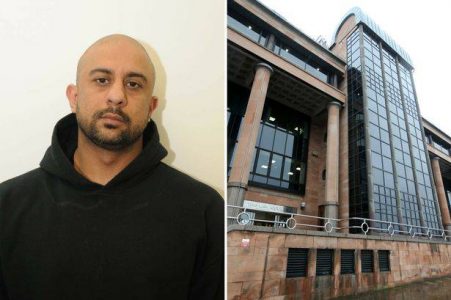
Convicted terrorist wins first round of legal battle against ban on early release from prison
A Sunderland shopkeeper jailed for encouraging terrorism has won the first stage of a legal battle to overturn new rules barring terror offenders from being released early from prison.
Lawyers for Mohammed Zahir Khan, who tweeted support for Islamic State (ISIL) and called for “death to Shias” say the emergency laws introduced by Justice Secretary Robert Buckland breach his human rights.
It is the first legal appeal against the Government decision to force some 50 convicted terrorists who had been due to be freed automatically halfway through their sentences to serve at least two thirds before a parole board decides if they are safe to release.
Khan was jailed for four-and-a-half years in May 2018 for encouraging terrorism, dissemination of a terror publication and stirring up religious hatred and would have been released in February but for the emergency laws introduced after the London Bridge and Streatham terror attacks.
His lawyers told the the court that the Terrorist Offenders (Restriction of Early Release) Act was directed against people holding “particular Islamic beliefs” and had a “disproportionate impact” on Muslims.
Lawyers for Mr Buckland had disagreed and said Khan’s challenge should be dismissed but a judge yesterday ruled that Khan had an “arguable case”, after overseeing a preliminary, virtual, High Court hearing.
Mr Justice Garnham said detailed arguments, from barristers representing Khan and Mr Buckland, should now be fully analysed at a trial.
He said the case raised a matter of “some considerable” importance and public interest. Hugh Southey QC, who led Khan’s legal team, said the legislation amended an early release regime, and extended the “requisite custodial period.” He said terrorist prisoners were clearly being treated differently from other prisoners.
He said the new legislative provisions were “unlawfully discriminatory” and breached rights enshrined in the European Convention on Human Rights – the right to liberty and the right not to be held guilty of an offence which did not constitute an offence when it was committed.
Sir James Eadie QC, who led Mr Buckland’s legal team, said the legislation was not discriminatory, and that the new provisions applied equally to all relevant terrorist offenders, regardless of “race, religion or otherwise”.
Sir James said Parliament was entitled to conclude that terrorist offenders were “to be distinguished on the basis of immediate and significant risk materialising” and the “difficulties in identifying and managing this risk”.
Mr Justice Garnham said Sir James’ arguments may succeed in the end. But he said that Khan had a “properly arguable” case which should be analysed in detail.
“It raises a matter of some considerable importance and some considerable public interest,” said the judge. “It needs to be dealt with quickly.”
Source: Telegraph





